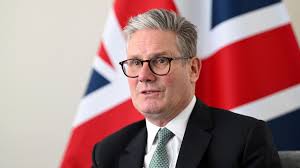Global Fury Erupts: UK's Palestine Recognition Sparks Outcry from Netanyahu and Political Storm

Sir Keir Starmer, the leader of the UK Labour party, announced controversial plans on Thursday to formally recognise Palestine as a state, a move expected to be confirmed this weekend. The Prime Minister indicated that the UK would proceed with this decision unless Israel met specific conditions, including agreeing to a ceasefire in Gaza and reactivating the prospect of a two-state solution. This significant foreign policy shift, while deeply symbolic globally, also represents a major political step for the Labour government domestically, following mounting internal and external pressure.
The announcement immediately drew strong condemnation. Tory leader Kemi Badenoch criticised the idea for "rewarding terrorism," while the US Government warned of "disastrous consequences." Legal experts have also highlighted the potential for the new state to demand substantial compensation, estimated at around £2 trillion, for land "taken from the Palestinian people" when Britain ended its control after the Second World War. Palestinian Authority President Mahmoud Abbas, known for past threats to sue Britain, is already seeking "reparations in accordance with international law" based on the value of land under British rule between 1917 and 1948. Families of hostages abducted by Hamas in the October 7 attacks wrote to the Prime Minister, claiming the decision "dramatically complicated" efforts for their relatives' release.
Israel's Prime Minister, Benjamin Netanyahu, vehemently opposed the UK’s recognition, labelling it an "absurd prize for terrorism." In remarks to ministers, Netanyahu stated that Israel would "fight both in the UN and in all the other fronts against the slanderous propaganda aimed at us, and against the calls to create a Palestinian state that will endanger our existence." Israel’s foreign ministry echoed this sentiment on X, asserting that recognition was "nothing but a reward for jihadist Hamas," and directly attributed by Hamas leaders themselves as a "fruit" of the October 7 massacre. Yaakov Amidror, a former national security adviser to Netanyahu, argued that this recognition would be perceived by Hamas as a reward for their 2023 attack, undermining any leverage Starmer might have had and asserting that a Palestinian state would not materialise. Amidror stressed Israel's determination to destroy Hamas, highlighting a "gap that cannot be bridged with nice words" with certain international friends who seemingly desire Hamas's survival.
Despite Netanyahu's hardline stance, successive opinion polls in Israel reveal strong public demand for a negotiated end to the Gaza conflict, and support for his right-wing coalition government has continued to decline. Tens of thousands protested at the weekend against the government, calling for a deal to secure the release of Israeli hostages held by Hamas since the 2023 raid. A coalition of hostage families condemned the "unconditional recognition of a Palestinian state while turning a blind eye to the fact that 48 hostages remain in Hamas captivity." Opposition Democrats party leader Yair Golan criticised the UK's recognition as a "grave political failure by Netanyahu," attributing it to "political recklessness: refusal to end the war and the dangerous choice of occupation and annexation." Golan argued for a demilitarised Palestinian state as part of a broad regional arrangement guaranteeing Israel's security. Israeli analysts suggest Netanyahu’s response will likely follow his trip to Washington, while far-right ministers like Smotrich and Ben-Gvir have called for wholesale annexation of the occupied West Bank, dismissing international influence on Israel's future.
The Labour government’s decision stems from significant internal pressure. Following the Hamas attacks and the subsequent scale of Israel’s response, concern mounted within the party and among the public. Many on its own side were disappointed by the government's previous stance that recognition would only occur as part of a negotiated peace deal. By July, over 100 Labour MPs had signed a letter advocating immediate formal acknowledgement of Palestine. Cabinet ministers, including then-deputy Angela Rayner and Foreign Secretary Yvette Cooper, privately urged the Prime Minister to act, with Health Secretary Wes Streeting expressing a desire for recognition "while there’s still a state of Palestine left to recognise." This move brings widespread relief within the Labour party, fulfilling a long-standing manifesto promise that, while largely symbolic, is considered important. However, some on the right of the party are concerned about potential damage to relations with key allies like the US without achieving concrete changes in Gaza.
Beyond the moral imperative, there was also a strong political motivation. Labour lost four seats in the previous general election to pro-Palestinian candidates due to dissatisfaction over its Gaza stance, with voters shifting to the Greens and leftwing independents. Downing Street insiders hope Starmer’s action will alleviate internal party pressure, especially with the threat of further losses for cabinet ministers like Wes Streeting and Shabana Mahmood. While recognition might not entirely resolve Starmer's issues and could create international tension (e.g., with Donald Trump), it demonstrates his willingness to listen and act on internal critics' concerns.
It is uncertain whether this recognition will satisfy the left. Many Labour MPs view it as merely one step, with further demands for the government on sanctions, arms, trade, and war crimes. Government advisers defend the UK's actions, citing the restoration of UNRWA funding, sanctions against far-right Israeli ministers and settler violence perpetrators, breaking off trade negotiations with Israel, backing the ICC, restricting arms licences, and increasing humanitarian aid. However, Starmer's perceived failure to publicly condemn Israel’s latest ground offensive alongside Donald Trump left many questioning his commitment to pressuring Netanyahu for a ceasefire. Figures like Jeremy Corbyn and Green party leader Zack Polanski welcomed Palestinian self-determination but urged the government to go further, including ending complicity in alleged genocide and stopping arms sales to Israel.
Across the wider UK, thousands have participated in pro-Palestine marches, indicating widespread public unease over the humanitarian crisis in Gaza. YouGov polling data supports this, showing 44% public backing for recognition versus 18% opposition, with 38% sympathising more with the Palestinian side. Labour insiders hope this decision will enhance Starmer's international reputation, despite the complex domestic challenges he faces.
You may also like...
Genetic Engineering: Ethical Innovation or Pandora’s Box?

"Genetic engineering promises cures, better crops, and scientific breakthroughs—but is humanity ready for the ethical di...
UCL Explodes: Brawl and Red Card Rock Controversial Monaco vs Man City Thriller!

A dramatic Champions League match saw Manchester City draw against Monaco due to a controversial late penalty. Erling Ha...
PSG Stuns Barcelona, Ending Undefeated Run with Ramos' Late Strike!
)
Paris Saint-Germain triumphed over Barcelona with a 2-1 victory at the Olympic Stadium, sealed by a late Goncalo Ramos g...
Sean Astin Leads SAG-AFTRA's Fierce Stance on AI, Vows Fight for Fair Compensation

The emergence of AI performer Tilly Norwood has intensified the debate on technology's role in Hollywood, leading SAG-AF...
Quentin Tarantino's Legendary 'Kill Bill: The Whole Bloody Affair' Hits Theaters for the First Time Ever!

Quentin Tarantino's complete vision, "Kill Bill: The Whole Bloody Affair," will finally receive its first nationwide the...
Trump Adviser's ICE Threat at Bad Bunny's Super Bowl Performance Draws Jay-Z's Fierce Defense

Bad Bunny's selection as the 2026 Super Bowl Halftime Show headliner has sparked political controversy, with a Trump adm...
Hollywood Split Scandal: Nicole Kidman Reportedly 'Blindsided' by Keith Urban's New Romance

Actress Nicole Kidman is reportedly "blindsided" by her sudden divorce from country singer Keith Urban after 19 years of...
Shocking Confession: Robbie Williams Reveals Decades-Long Secret Battle with Tourette's

Robbie Williams has bravely opened up about his mental health, revealing his experience with “inside Tourette’s” and his...




